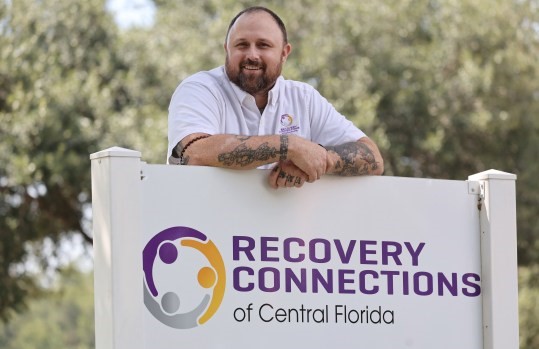In The News
Recovery Connections of Central Florida is a Recovery Community Organization (RCO), an independent 501c3 nonprofit organization led and governed by local recovery community representatives.
Learn more about our work and impact in the community.
Opioid settlements to fund overdose prevention in Orange County
Plans include a recovery hotline and a BATmobile.
Emil Caron, Director of Recovery Support Services at Recovery Connections of Central Florida, on Thursday, August 10, 2023. (Ricardo Ramirez Buxeda/ Orlando Sentinel)
By STEPHEN HUDAK | shudak@orlandosentinel.com | Orlando Sentinel
PUBLISHED: August 15, 2023 at 8:57 a.m. | UPDATED: August 19, 2023 at 1:00 p.m.
For a decade, Emil Caron’s use of heroin made him part of Central Florida’s opioid problem.
In and out of emergency rooms and jails, he lost his job, his marriage and nearly hope.
A brother died of an overdose, a sister, too. Caron figured he’d soon join them.
But authorities in Orange County now see Caron, in long-term recovery since 2019, as a part of a multi-strategy solution to quell a crisis that killed 373 residents last year and 164 through July of this year.
“I’m lucky to still be breathing,” said Caron, 45, who works for Recovery Connections of Central Florida and will assist a 24-hour support hotline to help people in recovery stay on track. “If I can share my story in a way that’s meaningful to someone who’s where I was, I’ll take that as a win.”
Orange County will use its large share of national settlement agreements with pill-makers and pharmacies that profited off prescription painkillers to fund the 407-RECOVER hotline and other initiatives to expand treatment access, aid patient recovery and prevent the epidemic from worsening.
The national settlements, estimated at $54 billion, ended lawsuits filed by Florida and other state governments to force drug-makers and pharmacy chains to pay a share of ongoing costs of the crisis.
Pending bankruptcy proceedings for defendant pharmaceutical firms may lower payouts.
But the county expects to get $53 million through 2040 — including $26 million over the next six years, said Thomas Hall, director of the Coalition for a Drug-Free Community, who outlined the plans last week.
The spending recommendations were proposed by an eight-person committee that included Dr. Robert Karch, state health officer in Orange County, and Dr. Raul Pino, Health Services director.
Hall said the panel wants most of the money used to reduce barriers to treatment and recovery.
Expanding delivery of medication-assisted treatment is critical because “a lot of clients that we work with don’t have access to care. They’re uninsured or underinsured,” Hall told Orange County commissioners. “They lack transportation; they lack stable housing; and they’re often forgotten.”
Medication-assisted treatment, MAT for short, is a comprehensive therapy regimen for patients with opioid-use disorder that blends a medication like buprenorphine or naltrexone with counseling.
The medications help block withdrawal symptoms and cravings that can interfere with therapy.
Settlement funds will pay for the medicine.
Hall said a MAT clinic operates in the Orange County Jail, the only jail-based clinic in Florida.
“We don’t just hand out medication,” he said. “We’re trying to help them get better all over.”
Hall said the county hopes to make medication-assisted therapy available at clinics serving vulnerable, low-income communities, filling a gap in services in areas where help can be hard to find.
Health Services also may invest in an RV-sized mobile unit to deliver recovery services.
Hall said the vehicle, estimated to cost about $300,000, can be stocked to provide vaccines or equipped to perform health testing and will be known as the “Better Access to Treatment” or BATmobile.
“We’re working on getting a Batman costume for Dr. Pino,” he quipped.
Medical Examiner records show 2,161 died by overdose in Orange County from 2018 to 2022.
Deaths dipped from a five-year high of 539 in 2021 to 462 last year.
While prescription opioids fueled the crisis in the 1990s and early 2000s, fatal overdoses in the Orlando-area are more likely to be caused now by a mix of street drugs that include fentanyl, according to a review of death data.
Tests of street drugs seized last year by the U.S. Drug Enforcement Administration found that six of every 10 fake prescription pills contained a lethal dose of fentanyl, a synthetic opioid described on the Centers for Disease Control and Prevention website as 50 times stronger than heroin.
Health officials said another settlement-funded program will take aim at a troubling statistic: 73 county residents died in 2022 of an overdose within a year of release from jail, or one of every four fatal overdoses.
“As alarming as that number looks, it is correct. This is true all over the country. People are at higher risk of dying within the first year of release and even higher within the first six months,” Pino said.
Hall, who has studied addiction and mental health disorders for 30 years, said formerly incarcerated people, upon release, are at risk for relapse and overdose, especially without continuing care.
He said settlement funds will be used to hire “opioid navigators,” state-licensed clinical social workers who will be tasked with helping inmates stay connected to care, support and treatment on the outside.
It’s not an easy job.
“It’s removing any barriers to keeping patients in treatment whether that’s with housing, employment, insurance, food, clothes, all the things,” said Michelle Dodson, who heads an AdventHealth team of 10 navigators who help more than 200 patients a week with substance use disorders.
The goal, she said, is to keep patients in recovery and help them live better lives.
shudak@orlandosentinel.com
Stephen Hudak | Journalist
Stephen Hudak is the Orange County reporter for the Orlando Sentinel.



